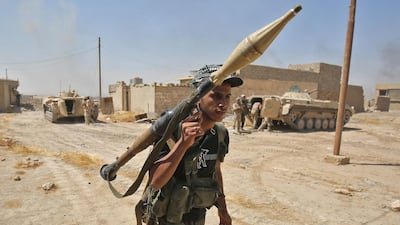On Monday, the scale of the challenge posed by Iran to US President Joe Biden's Middle East policy was laid bare when a rocket struck an American base in the capital of Iraq's semi-autonomous Kurdistan region, killing a civilian contractor and injuring six, including a US service member.
The attack was carried out by an Iran supported militia group, Saraya Awliya Al Dam, raising the complicated question of how the new American administration should deal with Tehran’s asymmetric warfare capabilities. It must do so urgently for the sake of the Middle East, especially Iraq, which is caught in the middle. Mr Biden will have to form a long-term strategy that counters a growing sense among Iraqis that America is an unreliable ally, not fully committed to stabilising their country.
Saraya Awliya Al Dam is a small and largely unknown group. Its obscurity should not come as a surprise; Iran's proxy war in Iraq is so difficult to combat precisely because the militias it supports vary greatly in size, prominence and function. Larger and better-known organisations take the spotlight and occupy the highest pulpits, putting their divisive, anti-western stamp on Iraqi society and politics. But violence of the kind seen on Monday is increasingly carried out by smaller groups.

This is not necessarily a sign of diverging strategies among Iran-backed militias. Their aims can vary but Qassem Suleimani, the deceased commander of Iran's Quds Force who was previously responsible for the Islamic Revolutionary Guard Corps' proxy wars, encouraged this kind of complexity. Splinter groups carried out Tehran's dirty work, while larger organisations promoted themselves as domestic political movements, capitalising on their role in defeating ISIS in Iraq.
This comprehensive strategy, which holds large parts of Iraqi politics hostage, stunts the country's development and threatens alliances with western powers.
A steady stream of attacks antagonises the US to an extent just short of the threshold for provoking a war – something Iran cannot afford – while undermining Iraqi faith in US security assistance.
Mr Biden must face up to this challenge. Without his support, Iran's grip on Iraq will increase. The fact that the attack took place in Erbil, often considered a safe base for diplomatic and aid operations in the country, indicates that Tehran is upping the ante and taking advantage of an America resting on its laurels.
Mr Biden has a chance to demonstrate that his administration will not tolerate Iran's destabiling use of proxies. He can do this in a non-violent manner by addressing Iran's use of asymmetric warfare as Tehran lobbies him to remove crippling US sanctions.
It is a complex task, but it is that way precisely because it is so important to accomplish.


